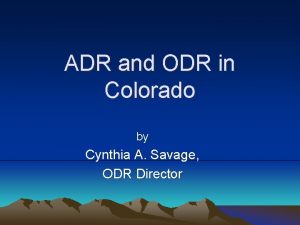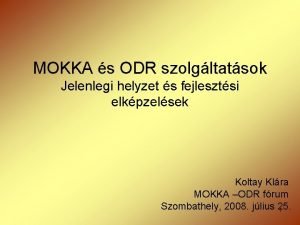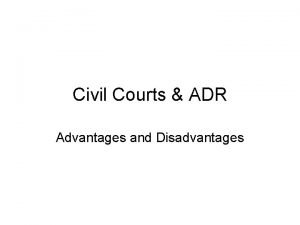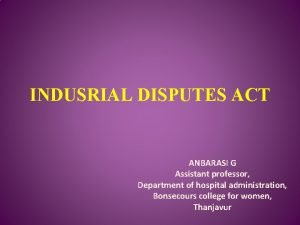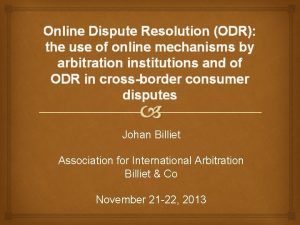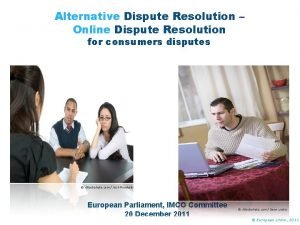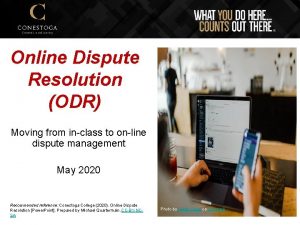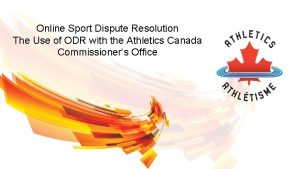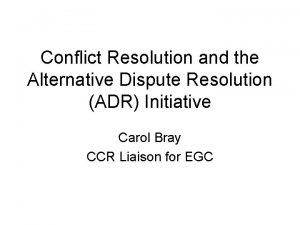Online Dispute Resolution Marrying ADR and ODR Tyler










- Slides: 10

Online Dispute Resolution Marrying ADR and ODR © Tyler Technologies 2018

Accessible Accountable Competent Online Mediator Ethical Standards Confidential Equal Fair/Impartial/Neutral Legal Secure Transparent © Tyler Technologies 2018

Online Mediator Ethical Standards 3 © Tyler Technologies 2017

ICODR Standards Accessible: ODR must be easy for parties to find and participate in and not limit their right to representation. ODR should be available through both mobile and desktop channels, minimize costs to participants, and be easily accessed by people with different physical ability levels. Confidential: ODR must maintain the confidentiality of party communications in line with policies that must be made public around a) who will see what data, and b) how that data can be used. Legal: ODR must abide by and uphold the laws in all relevant jurisdictions. Secure: ODR providers must ensure that data collected and communications between those engaged in ODR is not shared with any unauthorized parties. Users must be informed of any breaches in a timely manner. • • 4 © Tyler Technologies 2017

ICODR Standards Equal: ODR must treat all participants with respect and dignity. ODR should enable often silenced or marginalized voices to be heard, and ensure that offline privileges and disadvantages are not replicated in the ODR process. Fair/Impartial/Neutral: ODR must treat all parties equally and in line with due process, without bias or benefits for or against individuals, groups, or entities. Conflicts of interest of providers, participants, and system administrators must be disclosed in advance of commencement of ODR services. Transparent: ODR providers must explicitly disclose in advance a) the form and enforceability of dispute resolution processes and outcomes, and b) the risks and benefits of participation. Data in ODR must be gathered, managed, and presented in ways to ensure it is not misrepresented or out of context. • • • 5 © Tyler Technologies 2017

ODR Practice Dilemma #1 You are mediating a dispute between two business partners over the proceeds from the sale of their business, and their lack of progress is frustrating you. One night while you’re trying to get them to focus on the issues that need to be resolved, you enter one of the parties’ names into Google and discover that he had been fined for financial fraud in a prior business. This is news to you, but it helps you to understand some of the hesitation his partner has in agreeing to financial arrangements. What do you do? © Tyler Technologies 2018

ODR Practice Dilemma #2 You are mediating a workplace dispute over unpaid wages, and the former employee tells you in caucus that she’s so tight on money she can’t afford internet access in her house any more. She says she can use her phone, but soon after the frequency and length of her posts go way down, while the business owner keeps uploading more and more spreadsheets and posting messages every hour. Progress in the case slows to a crawl every day while you wait for the employee to respond, and the owner is getting frustrated. What do you do? © Tyler Technologies 2018

ODR Practice Dilemma #3 You are working with a carpenter and a building owner who disagree on the quality of work that has been completed. In the caucus space the building owner informs you that she has already hired a replacement, but that she has not yet told the current carpenter. You note the information but promise to keep it quiet. A week later, however, you accidentally post a message intended to be a private message to the building owner in the joint session, and the message refers to the replacement. You realize your mistake when the carpenter responds angrily, saying that this is a breach of contract. What do you do? © Tyler Technologies 2018

ODR Practice Dilemma #4 A landlord and tenant you are mediating have been arguing about the cost of some property damage for some time. Both the landlord and tenant are threatening to go to court. One day, you get an email from the landlord’s attorney (who has not been participating in the mediation) saying that the landlord has been forwarding screen shots of the mediation discussions, and accusing you of bias in the way you have conducted the mediation. The attorney is threatening to file an ethics complaint with the court, where he will share screen shots. What do you do? © Tyler Technologies 2018

ODR Practice Dilemma #5 The parties you are mediating are just tearing into each other in the joint discussion, throwing around accusations of fraud and uploading receipts that purport to prove bad intent. You’ve urged them both to move into the caucus spaces and to stop communicating in the joint discussion, because this dialogue isn’t achieving anything, but they’re ignoring you. What do you do? © Tyler Technologies 2018
 Msc construction law
Msc construction law Juliet fears madness in the tomb
Juliet fears madness in the tomb How does juliet regain her parents' favor
How does juliet regain her parents' favor Odr colorado
Odr colorado Mokka odr
Mokka odr High resolution low resolution
High resolution low resolution Delay and dispute mitigation
Delay and dispute mitigation What are the advantages and disadvantages of adr?
What are the advantages and disadvantages of adr? Wages act 1936
Wages act 1936 Krishna godavari dispute
Krishna godavari dispute Objectives of industrial dispute act 1947
Objectives of industrial dispute act 1947



